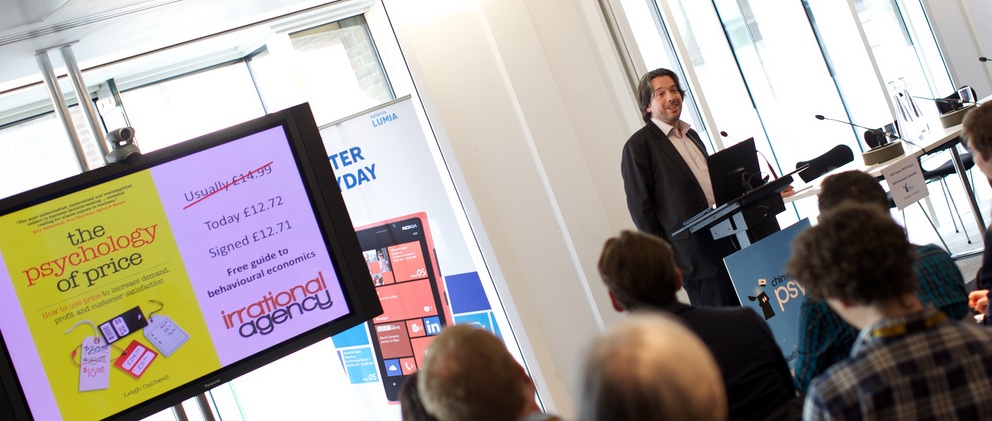Chinwag Psych Interview: Leigh Caldwell “You might say this is what our whole lives are for..."

Chinwag Psych saw experts across marketing, advertising, psychology, machine learning and neuroscience deliver ways best to understand your target market.
Through a range of academic speakers and practitioners, there was a lot to be learned about how we can gain insights to run an efficient team or what a customer might be thinking.
Leigh Caldwell is a combination of both academic and businessman as the CEO of Inon and a cognitive behavioural economist. But what is that and how did he end up with that title?
“It's kind of a new field,” he told Chinwag. “There's not a lot of education programs in behavioural economics and certainly not cognitive economics. I came to it via mathematics originally. After I left university I started a company and I wanted to try applying mathematics to the world of business and to understand how customers behave. Economic psychology ended up being the best way to do that.”
So what would psychology tell Caldwell that mathematics could not? Cross-disciplinary thinking certainly has its advantages of course, but the root of much of the work in daily business often comes down to the numbers.
“It was not exactly that they tell you different things, they are different ways of approaching the same problem,” Caldwell explains.
“Psychology is about experiments and measuring what people are like. Psychologists work on these problems by setting up simulations or experiments.
“They might put a certain amount of people in a room and give them goods and ask them to interact, maybe sell things to each other or present scenarios. These sorts of questions explore how people deal with money and how they make decisions about money.”
Caldwell says that mathematicians and economists can take the data from psychologists and scale this up. While psychologists cannot conduct experiments on an entire population, others can work with the results to create a bigger picture.
Balancing business and psychology
The idea of conducting psychological research while running a business may make some of the most dedicated workers blanch. But that is not to say that bringing psychology into a company is impossible.
“You have to give people simple, usable tools,” says Caldwell. “I don't expect business people to read the detailed original research as produced in universities. It's almost a full time job to keep up and so that's why I've written a book and why we do talks so that we can then translate all that research into step-by-step techniques.“
Through writing ‘The Psychology of Price’ Caldwell aims to help business people find an easier route through the required steps to understanding enough psychology to improve their chances.
There are many publications available to those with an interest in psychology for business and today those are written in a more digestible way. Caldwell notes that 'Predictably Irrational' by Dan Ariely or ‘Nudge’ by Richard Thaler and Cass Sunstein can help without making readers feel lost in academia.
Online magic
 At the Chinwag Psych event, Caldwell described how people make purchases online and what price points are suitable for that environment.
At the Chinwag Psych event, Caldwell described how people make purchases online and what price points are suitable for that environment.
There are many questions around this topic such as ending prices with .99, how to use a freemium pricing strategy and if the ‘gold’, ‘silver’ and ‘bronze’ tiered pricing works and how.
It seems that our online habits have not only changed the way we think about purchasing over the Internet but that some of those ideas have also spilled out into brick and mortar businesses.
“This varies by different kinds of consumers,” explains Caldwell. “There's still things that we buy in a store that are very habitual - we have been buying them and similar products in the same shops for decades. Those things are unlikely to be influenced by online habits.
“But an obvious example of change is that we can comparison shop more easily,” he continues. “People in the past might have been in a shop, seen the price of something and then had a vague memory of whether that feels like a good idea or looked at whether it was an expensive or a cheap shop.
“Now if it is worth the effort you can check online for prices so you may be less influenced by the reputation and the branding to estimate whether you think something is a good deal or not.”
Business and academia
Though more academic research is ending up in business practice, Caldwell believes there is still some way to go in order to make the most of the validated information that might be available to us.
He notes that there is a culture gap between business and academia, “You talk to academics and they say 'oh it must be so easy in business, there's so much money, you don't have to scrabble around for funding all the time. People get paid decently, it must be so much easier.’
“You talk to people in business and they say, 'Oh it must be so much easier in academia, you can just sit around all day thinking and studying and you don't have to do any real work.’
“Everybody has this idealised and not very realistic picture of the other side. I think the biggest gap is a cultural one. Business people very often don't quite understand and therefore don't always value how things are done in academia.”
Caldwell says that scientific method is still not as widely used in business as it could be. Businesses are often entrenched in old habits that are not helping to move things forward. “There's a huge amount of inertia and that's a big barrier to psychology and other sciences being adopted in business,” he says.
On the other side of the coin, Caldwell notes that academia has a bit of mistrust when it comes to business. “There's a lack of appreciation of the pressure that businesses are under to find specific solutions to their problems,” he says.
“If academics want to work with business, they have to work to solve a real business pain, they don't always understand this or sell themselves into business well.”
Those barriers need to come down if both parties are to benefit from a rounded solution for academics, business people and as a result - customers.
Caldwell says that there is a huge role for a scientific and psychological approach to business.
“It’s important to understand a consumer's perception of your company and your products as well as their perception of the whole world and their lives to see how those things fit together,” he says.
“If you can see how the consumer perceives your product in the context of their whole life, then you will be able to not only sell more but also make consumers lives better by creating value for them. I call this cognitive value.”
Caldwell says that if people can see a way for a product to be used in a new way in their lives and that value is created, then this perfectly fits the reason for a business to exist. “You might say this is what our whole lives are for - creating value for other human beings,” he says. “Psychology should be at the heart of that process.”
To find out more about the cognitive economic approach to business, have a look at the presentation that Caldwell gave at Chinwag Psych. Along with his insight, there is a strong selection of other presentations which might just spark something that changes the way you create value for consumers.




